
But his current one, simply called Cavalera, may be his most personal yet – as it features the singer/guitarist’s brother (drummer Iggor Cavalera) and son (bassist Igor Amadeus Cavalera) – along with the guitarist from extreme metallists Pig Destroyer (Travis Stone) rounding out the line-up.
And their latest release is a complete re-recording of Sepultura‘s 1987 offering, Schizophrenia, which comes on the heels of other recent re-recordings of early material from the band Cavalera co-formed with his brother in 1984 (but exited in 1996), and can be ordered here.
Cavalera spoke with AllMusic shortly before the release of Schizophrenia, and explained why he and his brother are re-recording this early material, in addition to several other metal-related topics.
How special is it being in the same band with your brother and your son?
Cavalera: “For me, it’s an amazing feeling. Because you get to combine the music aspect of it with the family aspect of it – which are both my passions. I’ve been playing with my brother my whole life, so we are very connected. And having my son and Travis in the band is like an injection of new blood. They bring all the youth, because me and my brother are in our mid-fifties right now, and have been in this a long time. So, it’s cool to have two older guys and two younger guys – it creates a certain chemistry. It’s quite unique and it works really good because you have the experience and the wisdom of the brothers, and you have the youth and the energy of my son and Travis. So, it’s fantastic. It’s a dream come true for me to be able to do this. I’m really enjoying this – working on the record and getting to play it live.”
How did the idea come up to re-record the early releases Bestial Devastation, Morbid Visions, and now, Schizophrenia?
Cavalera: “The idea is actually not mine – I can’t take credit for that. That’s actually my wife’s idea, Gloria. And it was really out of the blue. She mentioned to us, ‘Wouldn’t it be cool if you guys re-recorded your early stuff? Because the sound of it is a bit crap.’ [Laughs] And I was like, ‘You can be honest. It’s total dogshit.’ But they’re amazing songs – that we wrote as teenagers. I was entering my beginning of writing music, and still coming to terms with the idea of what writing a song is like. I didn’t even know about tuning, man. Our first thing, Bestial Devastation, I think it is tuned to D by accident. Because I just tuned by ear. And the other records we went back to E standard. But it was all exciting.”
“I love those records, but there was always a part of me that was like, ‘I wish they would sound as good as what we sound like live.’ And I’m not just talking about me – I’m saying that for many other bands. I’d love to hear Slayer’s Show No Mercy with a killer sound recording. Or Exodus: Bonded by Blood, or Metallica: Kill ‘Em All. So, I think for us, it was kind of an easy decision. Like, ‘This sounds really shitty. It would be cool to give them a real, true sound – but keep the savagery of the original.’ I think that’s the key element of our recording – we kept it still really dirty and raw. We didn’t clean it up and make it super pop-ish. We kept it brutal, like the originals.”
How would you describe the state of metal when those albums were first released in the mid to late ’80s?
Cavalera: “It was adventurous. It was the beginning of it. Of course, there was no internet – everything was done by tape trading. I used to be pen pals with Chuck [Schuldiner] from Death and the guys in Morbid Angel and Mayhem. And we used to read a lot of fanzines. What was cool was back then, if you wanted to find bands, you’d just look at the ‘thanks list’ on the album that you like,
What was cool was back then, if you wanted to find bands, you’d just look at the ‘thanks list’ on the album that you like, and you’d find all these bands they thank, and it’s a sure thing that if you find those bands, you’re going to find some gems in there.
and you’d find all these bands they thank, and it’s a sure thing that if you find those bands, you’re going to find some gems in there. That’s how I found most of the bands at that time that influenced us. It was exciting but not much money involved – we were broke. Real, real broke.“
“But we were starving to do this thing – to make this a reality. So, we were game for everything. We just wanted to play. And we did all these crazy things, like sleeping under the stage and playing for free. A lot of people took advantage of that situation and ripped us off. It’s all part of the learning experience. But it was an exciting time in metal, especially the mid to late ’80s – metal was reinventing the wheel. The old guard – Maiden and Priest – were still there, but there was something new coming up. The death metal, the thrash, hardcore – those three elements really helped shape the sound of what Sepultura was doing back then.”
Was there a sense at the time that thrash and extreme metal were going to be the next big thing in metal?
Cavalera: “You couldn’t really tell at that time, because it was still so underground. But we had hints of what was to come – the success of Metallica. Metallica was opening the doors for that stuff to become more popular – especially after opening for Ozzy [in 1986, in support of the Master of Puppets album]. And especially when we recorded Schizophrenia, this album is like we drank a lot from the fountain of the likes of Metallica, Exodus, Destruction, and some punk stuff. The actual name of the album was taken from a punk band from Finland called Riistetyt. They’re from the hardcore/Discharge area of sound. And they had an album called Skitsofrenia which I thought was a cool name, so I just borrowed the name for this album.”
“I think it was definitely an exciting time, and for us, this record was really important, because this is the album that got us signed to Roadrunner. So, it was important that we made a good record, too. It was almost like a business card – you give this album to people, and, ‘This is what we have. This is what we’re made of right now.’ And hopefully people see the potential and have faith to invest in this for the future.”
By going back and re-recording these early albums, did you rediscover any tracks you may have forgotten about?
Cavalera: “Something like ‘Inquisition Symphony’ is really out of the box – making an instrumental that has a thousand riffs and is inspired by classical music, but with metal in it. And then just the energy of the record, stuff like the first track, ‘From the Past Comes the Storms’ – the triplets that I open the record with, it’s still to this day one of my favorite riffs I’ve ever written. And I still am still recycling that riff after all these years – it’s just too good.”
What were some of your favorite metal albums from that era?
Cavalera: “At that time, probably Dark Angel: Darkness Descends, Voivod: Killing Technology, Celtic Frost: Morbid Tales and To Mega Therion. And some punk stuff as well, like Dead Kennedys: Fresh Fruit for Rotting Vegetables, Discharge: Hear Nothing See Nothing Say Nothing. We listened to a lot of that stuff.”
Could there be a movement like ’80s thrash again?
Cavalera: “I think it’s still happening. This is what’s cool and fun about metal – it goes in circles. You see some of these revivals. And they’re fun and exciting. Sometimes, a little bit of an overkill when there’s too much of it. I was actually talking to my son, and I was asking him about sludge and doom metal – it is very unpopular right now, but was quite popular a bunch of years ago.
That’s the thing about metal – it’s like cockroaches, it won’t ever die. It endures. It morphs into different things, but it stays there – it never really goes away. Sometimes, it’s less popular and more popular, but it never just totally dies out. That’s what attracts me. I’m a lifer – I’m going to be doing this my whole life.
I can see that making a comeback in a couple of years. I just love playing metal and playing music – I don’t care how popular it is and how big is it going to get. That was never my first intention. We never got into this thing to make money in the first place. There was no money. And it wasn’t to get girls – because we weren’t really ‘girl material.'”
“What we were left with was the pure passion – very unfiltered, organic passion – for what that music gives you. The raw power energy that music gives you. Which to this day is still an amazing thing to feel that connection with the music and the fans. That doesn’t go away. One of the reasons why I’m still making music and playing is the feeling I get when I play this music – especially fast music. I don’t know what it is about fast music, man. It’s just fun. It must be a connection with race driving – it’s just fun to go fast. And the same with music – it feels great to play fast.”
What can fans expect from the upcoming tour?
Cavalera: “We are calling it the Third World Trilogy. Because those are the three records of the era, and we refer to that era as the Third World Era, because Brazil has been a third world country and we thought it was a catchy, strong name for the tour. And we’re going to be playing stuff from all these three albums combined. Which is really cool, because then you get a really powerful set. You could go and play the whole album in its entirety – which we’ve done before – but I think if you mix them up and you play the best out of the three records, you have one powerhouse of a show.”
Who is a musical artist that your fans may be surprised that you admire?
Cavalera: “I like a lot of Paul Simon and world music. Peter Gabriel, Dead Can Dance…some rock stuff like Tom Petty and Eddie Money. My favorite one of that is probably Link Wray. Link Wray is ‘my guy’ – I’ve been a fan for a bunch of years. I really like the Link Wray style of surf guitar and him being a Native American, I thought that was cool, too. Some fans may be surprised to learn I like some country music. Which I never liked it when I was a kid. When I was making Schizophrenia, no country – I did not listen to that at all. But it kind of grew on me and I liked it – especially the outlaw country stuff, the old school cats.”
Any other upcoming projects you’d like to discuss?
Cavalera: “I’m in full writing mode now for the next Soulfly album – for next year. It should be really powerful. This is our thirteenth studio record and we’re working on it throughout the year. Whenever I come back from these tours, I’ll get back to writing. I’m very excited for the Soulfly album – we haven’t done one in four years. By the time we release it, it will probably be five years – that’s the longest space between Soulfly records that I’ve ever had.”
What do you think of modern day metal?
Cavalera: “I like it. That’s the thing about metal – it’s like cockroaches, it won’t ever die. It endures. It morphs into different things, but it stays there – it never really goes away. Sometimes, it’s less popular and more popular, but it never just totally dies out. That’s what attracts me. I’m a lifer – I’m going to be doing this my whole life. I think there’s a lot of really cool potential in a lot of the young bands out there. And I like a lot of it – Fugitive, Mammoth Grinder. And I like it mixed with the hardcore sound, as well – Kublai Khan, Jesus Piece. They’re doing something really with it, too. I think the internet helps a lot – you see a lot more exposure of bands on the internet with all the socials and all that. It’s in a good place. I think it’s going to continue growing, expanding, and reaching out for more people. Which is great.”
For more info, visit cavaleraconspiracy.net.
Source






